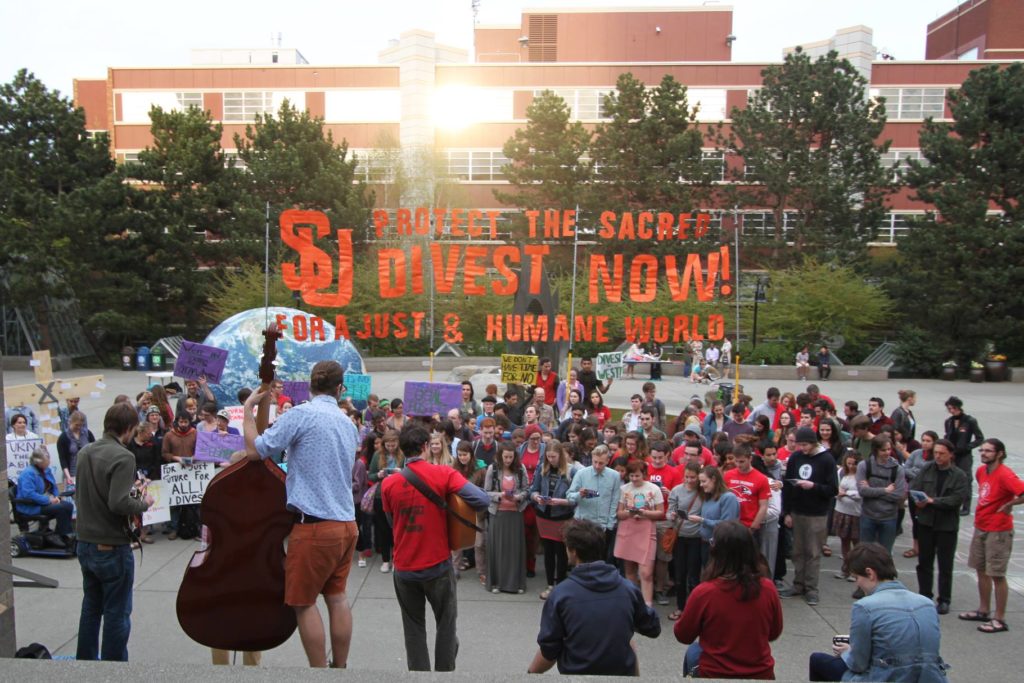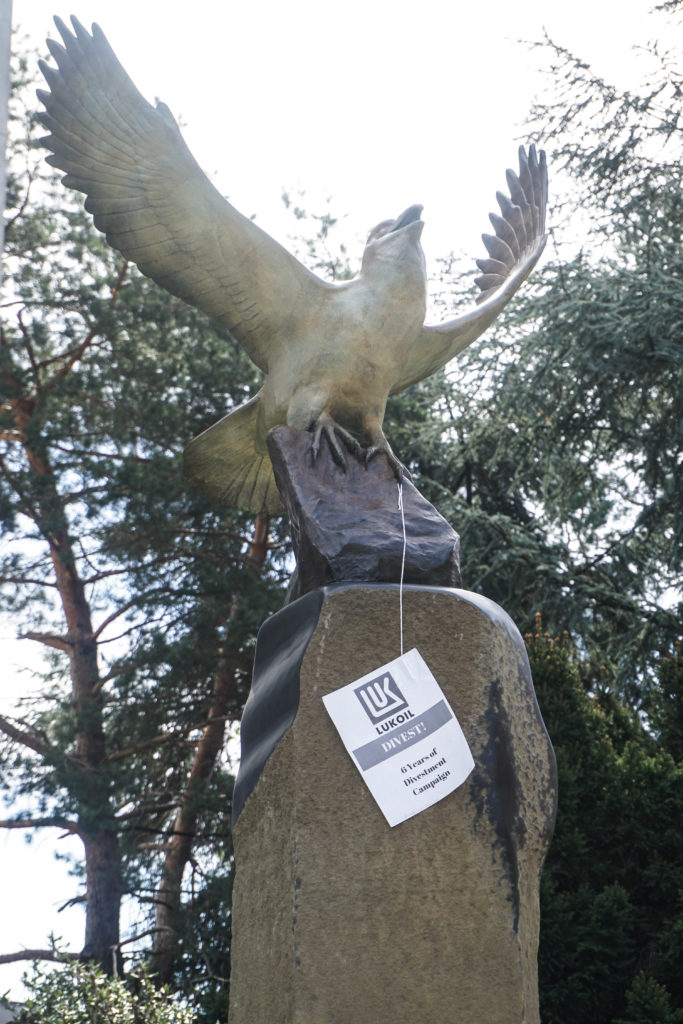After an arduous six-year battle, Seattle University has committed to divesting from companies owning fossil fuel reserves over the period of the next five years. This makes Seattle U the first university in Washington—as well as the first Jesuit university in the country—to make this pledge.
In February, the Socially Responsible Investment (SRI) advisory working group, a subcommittee made up of students, faculty, staff, and board members, unanimously brought forward the recommendation to divest to the Seattle U Board of Trustees. In early September, the Board voted in favor of adopting the recommendation and set a June 30, 2023, deadline for divestment, with a mandatory milestone of needing to be at least 50 percent of the way divested by December 31, 2020.

Members of the Divestment movement gather on Seattle U campus for an SSA rally in 2014.
Wes Lauer, associate professor and director of environmental science, is a member of the SRI advisory working group and one of the members who brought forward the recommendation to divest.
Lauer, not long after the universities announcement to divest, recounted hearing a radio advertisement for a bank that was creating fossil-free investment options for their clients. He saw this as indicative of wider change and correlates Seattle U and other institutions who have commited to divestment as driving this.
“One of the big responses is typically that any single institution is too small to force the really high powered investment managers to do anything,” Lauer said. “That’s one of the big changes we can help facilitate because now we’re providing support in a way that the other institutions can too. This argument that you’re too small is just an argument that’s tough to swallow for me.”
Valentina Zamora, an associate professor of accounting and member of the SRI advisory working group, agreed with Lauer’s assessment.
“Having done some of the groundwork of talking with like-minded organizations—both in the financial institution sector as well as the nonprofit sector—within greater Seattle, we’re not alone in thinking that we’re all kind of small, but we all are inching the demand,” Zamora said. “Perhaps collectively we can aspire to something better, but small doesn’t mean ineffective.”
This illustrates a common thought among those involved in the university’s divestment decision: while the decision by Seattle U to divest will not save the world on its own, it is an important statement that has the potential to spur change in a variety of ways.
“It could be a momentum builder,” Seattle U President Fr. Stephen V. Sundborg, SJ said. “I would really encourage our own students to make contact with other universities where they have similar sort of active groups to promote what has been done here and say it can be done.’”
The active group Sundborg alluded to is Sustainable Student Action (SSA). Founded in 2012, SSA formed as an environmental justice and anti-racist group with the primary goal of making fossil fuel divestment a reality at Seattle U. Throughout their six years as an active group on campus, SSA has employed a variety of tactics focusing on convincing key university decision-makers of the importance of divestment.
“This is an instance where they called us to account in regard to being leaders for a just and humane world and a sustainable world,” Seattle U President Fr. Stephen Sundborg said, alluding to the university’s mission statement. Sundborg heaped praise on the group and credited them as playing a “vital part” in advancing the issue of divestment at Seattle U.
Breaking Down the Economic Language of Divestment
In order to fully understand divestment, one must first understand how the university’s endowment works. An endowment is a collection of funds and financial assets. These funds are donated with the purpose of being invested to produce more income in the long run for the university. Seattle University’s invested endowment currently sits at $230 million.
There are two ways that institutions participate in investments — direct investments and commingled funds. Direct investments, as the name suggests involves purchasing specific stocks or bonds. Commingled funds are groups of investments sold as a package by a fund manager. Seattle U currently only invests in commingled funds.
The university does not have direct control over what these managers choose to invest in. This is where fossil fuels enter the conversation. In order to divest, the university must rid itself of all commingled funds that contain any investments in fossil fuel reserves, no matter how large or small.
There is also the issue of commingled funds that do not currently contain any investments in fossil fuels, but their managers do not have policies that prohibit them from doing so.
Seattle U’s Chief Financial Officer and Vice President of Finance and Business Affairs Connie Kanter stated that the university’s policy on remaining invested in such commingled funds will have to be evaluated.
“We’d have to be constantly monitoring to sell it as soon as they do that. More likely, if it’s a commingled fund where there’s a possibility they’re going there, we would just divest it as well.”
SSA, however, is not fully satisfied with the decision. Their primary grievance being that while the university is now committed to divesting from companies that own fossil fuel reserves. The university has not committed to divesting from companies involved in other aspects of the fossil fuel industry, including those that extract, process, and transport fossil fuel.
Emily McCrite, who no longer attends Seattle U, was asked to join SRI as the student representative during her time at the university due to her involvement with SSA.
“I know that SSA was obviously elated that it actually happened, that the work paid off, but they didn’t agree to a complete divestment,” McCrite said.
Additionally, SSA is critical of the university’s lack of transparency in regards to the endowment. Current SSA member Molly Mattingly, a senior sociology and public policy major, echoed McCrite and expanded on the issues SSA has with the current plan.
“Because we are a private university, they don’t actually allow students access to that information. We’ve asked for it before, but they won’t give it to us, so we don’t know what portion of the endowment is going toward those companies,” Mattingly said.
In response to SSA’s critiques of the current divestment plan, Kanter said that “no one has actually done what they’re pushing for.”
Sundborg has also stuck by the current plan.
“I think this was thoroughly examined, I think the recommendation that was made was the right recommendation. I think the Board of Trustees has made the right decision on it and that is the decision of the university, and I don’t see the reopening of that in a different kind of a way in the future.”
Sundborg reiterated that the SRI advisory working group unanimously proposed the recommendation to divest from companies owning fossil fuel reserves.
While university administration have seemingly shut the door on discussions of further fossil fuel divestment for the time being, the SRI advisory working group will remain an ongoing and active subcommittee. Though so far it has focused only on the issue of divestment, in the future it is not necessarily constrained to this single social issue.

A sign promoting the Divestment movement hangs from a statue on campus.
With the five-year plan in place, there is the potential for attention to shift away from the issue of divestment; however, SSA plans to continue to push for divestment from all companies involved in the fossil fuel industry.
“Those companies are still really, really impacting indigenous communities, low income communities, and communities of color,” Mattingly said. “You can create a recycling program on campus, but that doesn’t really have a direct impact on the people who feel the most impact of climate change.”
With environmental conversations currently at the forefront, Lauer said he would personally like to see conversations about the university going carbon-neutral.
“Seattle is really well situated to do that because most of the electricity that we buy comes from hydropower, so it’s not generating carbon dioxide emissions. But we still travel, people still commute to campus, and so maybe we have a slightly easier time addressing that than other institutions, but even addressing those issues is challenging.”
Lauer is proud of the work he and the SRI committee have completed and recognizes SSA’s contributions and the importance of persistent student action.
“Continue to advocate,” Lauer said. “All of this is happening ultimately because students pushed for it.”
The editor may be reached at
[email protected]












